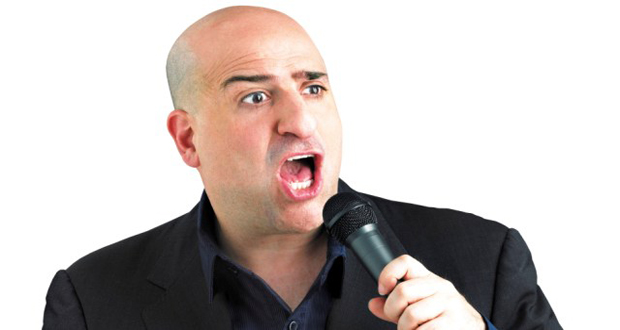Review: Omid Djalili Live, Grand Opera House, York

Boothby Graffoe was tonight’s support act at the Grand Opera House in York, which he fulfilled like no other comic I’ve ever seen. Apparently unconcerned by the pressure of the stage, Graffoe sauntered through a set which was ironically awkward, and alternated between amusing and bemusing. Musical paraphernalia was picked up and then thrown aside, and audience interaction took a hilarious and almost sociopathically mocking tone.
Djalili himself arrives onstage wrapped up in a rug with a pillowcase over his head, carried by two masked men. It’s actually a very physical way of beginning the act, but it quickly becomes obvious just how varied Djalili’s performance will be: one-liners, sight gags, political jokes, physical comedy and those impressions which border on character comedy follow hot on each others’ heels. The range of jokes is incredible, but the quality never slips; every joke is delivered with equal aplomb and care.
It’s also a curiously self-aware show; a set of drums stands in the corner, which the comic uses for musical interludes which, in his own words, have no purpose but to break things up a bit. The projector screen is similarly used: as and when the jokes take him to that part of the stage. There’s nothing forced about it, and the lack of apparent structure is quite relaxing, really.
Quite apart from the jokes, Djalili is a great orator. I often caught myself nodding and responding as if we were talking one-to-one, and that really is an indicator of just how light and conversational the tone is. Even when dealing with the political intricacies of the Arab Spring, Omid doesn’t slow the pace, and that’s what allows the audience to go on laughing almost constantly throughout the show.
Let me say that again: the laughter was almost constant. That is hard to do, and while good, varied jokes and a light tone help, Djalili’s secret weapon is his reading of the audience: he has sensitivity to the room which is like no other. It’s easy to see why the Iranian finds it so hard to break with his crowd-pleaser side: he knows exactly what his audience wants, and he can’t help giving it to them. It’s evident everywhere. He mixes older material in with the new, because – as he tells the crowd – he can’t resist telling them again. He unabashedly admits, when confronted by an audience member from Jordan, that he has no joke for that. When Boothby uses the PA to promote his albums during Omid’s joke, they start a riff which feels really natural and spontaneous.
There is the political side too, however, and it’s easy to forget – although not for very long – how sophisticated some of the points being made are. It’s very smart material, belied by more simple punchlines than elsewhere in the act. Djalili uses it sparingly, and there is a sense sometimes that he is cautious of these moments, and of delving too far. If he is, he needn’t be: his onstage persona is more than large enough to stand astride of both implicitly and overtly political, and when he does the desire to applaud is as strong as the impulse to laugh.
The end result is a show which is balanced between intelligent and crowd-pleasing, and much better for it. It is varied, and although there are delightful recurring motifs it’s not fluid- there is a real sense that the structure is organised on the spot, based spontaneously on what part the one-of-a-kind comedian is most eager to tell at the time. There could easily be a more sophisticated and cerebral comedic future is in store for Omid Djalili – but if nothing else, this tour proves the compatibility of that sophistication with the jokes he knows we love to love.



































